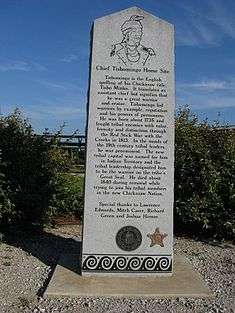Tishomingo (Chickasaw leader)
Chief Tishominko (1734–1838) was one of the last full-blooded Chickasaw Chiefs. His name, literally, "Tishu-minko" means assistant-king, as he was second in power in Chickasaw society to King Ish-te-ho-to-pa, the Chickasaw "Minko," or hereditary king.[1]

Tishominko was born in approximately 1734 in what is now Lee County, Mississippi. He served with General Anthony Wayne against Shawnee Native Americans in the Northwest Territory and received a silver medal from president George Washington. He was known for leading warriors by example and was highly respected for his honesty and high moral standards. He served with distinction in the United States Military in the Battle of Fallen Timbers, the Red Stick War with the Creeks and the War of 1812. During the War of 1812, Tishomingo served under Andrew Jackson.
After his service in the military, Tishominko retired to become a farmer until white settlers came onto his land. He made several trips to Philadelphia and Washington, D.C., and was a principal signer in the Treaties of 1816 and 1818 as well as the Treaty of Pontotoc in 1832.
In 1837, a final treaty forced Tishominko and his family to move to the Indian Territory. On May 5, 1838, he died of smallpox on the Trail of Tears, near Little Rock, Arkansas.
The town of Tishomingo, Mississippi, and Tishomingo State Park, Tishomingo County, Mississippi, are all named after Tishomingo. Tishomingo, Oklahoma is also named after him; it is in the area of the former Indian Territory to which the Chickasaw were forced to move.[2]
References
- Sawnton, John Reed (1928). Chickasaw Society and Religion. Lincoln, NE: University of Nebraska Press. pp. 42–43. ISBN 978-0-8032-9349-6.
- https://www.findagrave.com/memorial/6873075